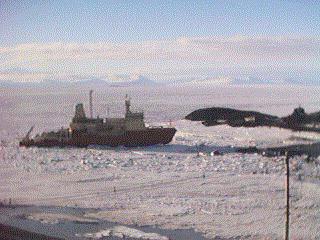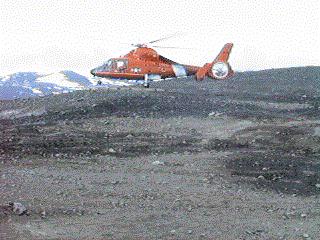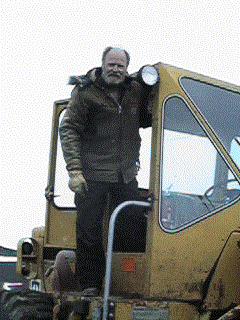

Hi Kids,
There has been a lot going on the last few days. A few days before I arrived, a Coast Guard Cutter broke through the ice and entered the McMurdo sound. It turned around and went back out to the open water. On Monday January 15, I looked out the window about 11 PM and saw the National Science Foundation ship, Nathaniel B. Palmer, cutting through the ice and rounding the tip of Hut Point. It moved very slowly, and would get stuck and back up to try again. It finally got into the harbor area, and turned around and stopped. The next morning when I got up, it was still in the same place. I found that it stopped because there was nobody working in McMurdo to handle the lines. They finally moved the ship into the harbor and tied it in place. The Nathaniel B. Palmer is a research vessel for scientists working with the NSF.

On Tuesday I met Sandra Markle, who is a famous teacher and children's author. She is in McMurdo doing research for some books she is writing. She went to the south pole for a few days, and is presently living and working in McMurdo. Soon she will be going on the Nathaniel B. Palmer. Information about her efforts is posted on the Web. I shared our efforts by showing her the pages Patti has made, and told her about the letters from the kids. She was impressed by the efforts of us all.
 On Wednesday I traveled to Black Island for training on a new satellite
link that was just installed. Black Island is in The Ross Ice Shelf,
and about 25 miles from McMurdo. I got to ride for the first time on
a helicopter. The helicopter was operated by the US Coast
Guard from
the Ice Breaker ship.
On Wednesday I traveled to Black Island for training on a new satellite
link that was just installed. Black Island is in The Ross Ice Shelf,
and about 25 miles from McMurdo. I got to ride for the first time on
a helicopter. The helicopter was operated by the US Coast
Guard from
the Ice Breaker ship.
On the island is a field camp that is larger than most. Because of the size, there is a camp manager named Larry, and a camp cook named Jill. Larry and Jill live there most of the week, but try to come into McMurdo on the weekends. Larry takes care of all the arrangements of life in the camp, and Jill does a wonderful job of cooking. The Island holds two satellite dishes for communications back to the world.
 Being a remote camp, there are several problems in keeping it operating.
The electricity for the camp is provided by solar and wind power. In case
either is not sufficient to run the station, there is a diesel generator
to supply the power. Early in the season, water has to be carried to the
camp in tanks on the backs of Deltas, which look like flat bed monster
trucks. This time of year, they draw water from ice melt runoff that
collects in a pond.
Being a remote camp, there are several problems in keeping it operating.
The electricity for the camp is provided by solar and wind power. In case
either is not sufficient to run the station, there is a diesel generator
to supply the power. Early in the season, water has to be carried to the
camp in tanks on the backs of Deltas, which look like flat bed monster
trucks. This time of year, they draw water from ice melt runoff that
collects in a pond.
I had heard of the good food, but it was better than I expected. Jill had a large crowd for lunch, about 12 people in all. She baked a delicious blueberry pecan coffee cake for mid-morning snack. For lunch, we had fresh baked bread, taken out of the oven a few minutes before lunch, along with home made soup and salad. For dessert we had fresh baked brownies, that came out of the oven while we were eating lunch.
I found Jill to be a most interesting woman. She is from Eastern
Washington, very near to Idaho. She has a husband and kids that are now
grown and getting through college. She worked for many years in
accounting and business, and felt she needed a change. Jill is like
other people I have met, that dropped careers to take a job in a place
few people will ever see. The experience of working here is very hard
to describe, as hard to describe as the views of the mountains and the
ice.
Dave
David Hess NK3T